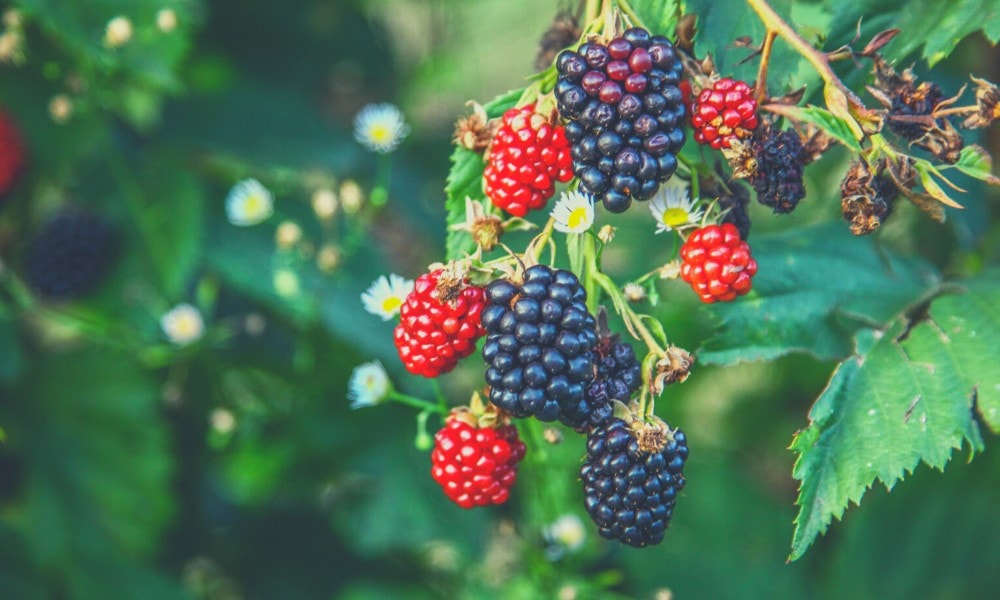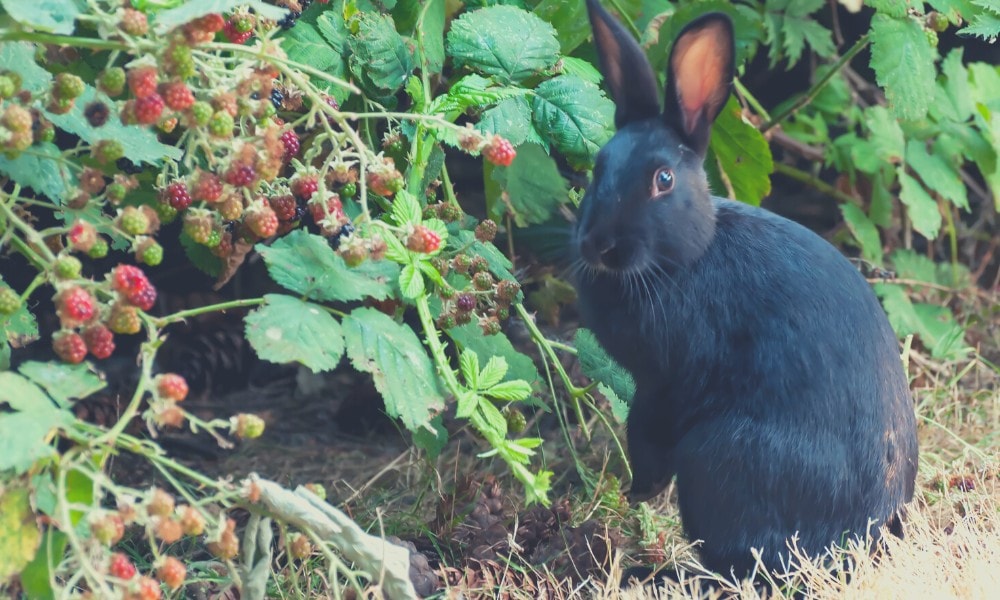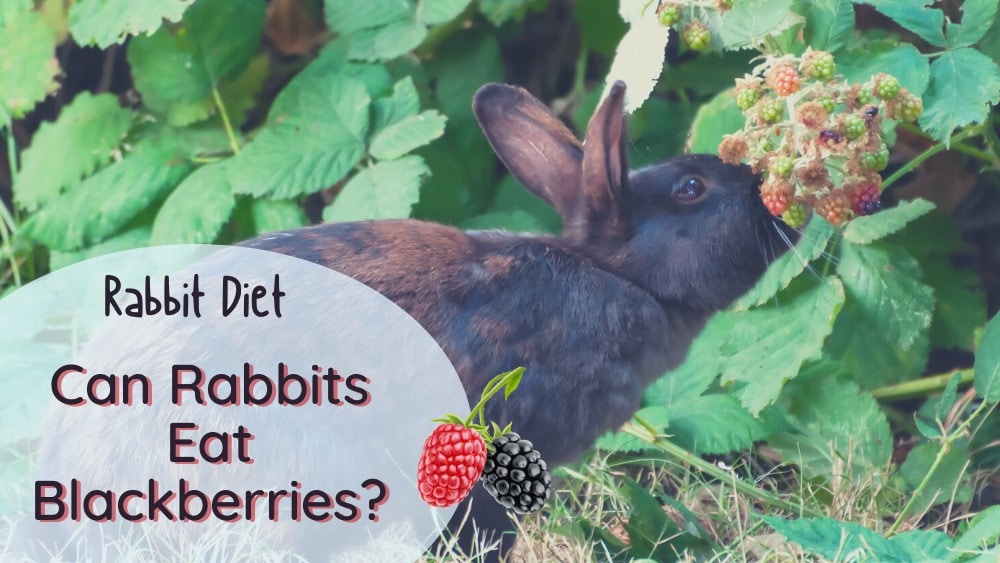Blackberries are as delicious as they are nutrient-packed, and they make an excellent addition to any table. Wild rabbits eat blackberries in their natural habitats. Can pet rabbits enjoy this juicy treat too? Most importantly, are blackberries safe for pet rabbits as they are for wild rabbits?
As a rabbit owner, we understand you may want to share tasty treats with your beloved bunny. However, before you do so, it is important that you ensure that these treats would not end up harming your rabbit.
This article will discuss all the necessary information that every owner needs to enable them to safely feed their pet rabbit blackberries. We will cover:
- Blackberries’ health benefits
- Parts of the blackberry plant to feed rabbits
- How to feed rabbits blackberries
- Risks associated with feeding rabbits blackberries
Can Rabbits Eat Blackberries?
Blackberries are safe for mature rabbits to eat in moderation. Although blackberries contain several nutrients, including several vitamins, that can be beneficial to your rabbit’s health, their high sugar content does not make them an ideal treat for your pet rabbit. Feeding too many blackberries can upset your rabbit’s stomach and may even cause unhealthy weight gain.
What Are the Health Benefits of Blackberries?
Blackberries contain several nutrients that can be beneficial for you and your pet rabbit. Here are some nutritional benefits contained in 100 grams of blackberries:
- Dietary fiber – 5 g
- Sugar – 4.9 g
- Protein – 1.4 g
- Fat- 0.5 g
Blackberries contain several vitamins like vitamins B6, C, and D. Minerals like calcium, magnesium, sodium, and potassium are also present. Additionally, the natural pigments in blackberries – anthocyanins – serve as potent antioxidants that protect the body cells from damage by free radicals.
However, the high sugar content in blackberries does not make them ideal for your rabbit’s digestive system. So while your rabbit may enjoy this fruity treat, it is important that you do not let it eat too many.

Should Rabbits Eat Blackberry Plants?
While we’ve established that rabbits may eat blackberry fruits in moderation, what about blackberry plants? Here’s a quick guide on other parts of the blackberry plant you may safely feed your pet rabbit.
Can rabbits eat blackberry leaves?
Bunnies can eat blackberry leaves. Ensure they are fresh and free of pesticides or herbicides. Their low sugar content makes them ideal to include in your rabbit’s bowl of leafy greens.
Can rabbits eat blackberry bushes?
Yes, rabbits may graze on blackberry bushes. However, ensure that these bushes have not been sprayed with insecticides or pesticides, as these will harm your rabbit.

Can rabbits eat blackberry seeds?
Blackberry seeds are tiny and are embedded into the flesh of the berry. You do not have to remove them before offering your bunny this delicious treat. Their size makes it easy for them to safely pass through your rabbit’s gastrointestinal tract. However, you should note that feeding rabbits bigger seeds generally comes with a risk of choking or gastrointestinal blockages.
How Many Berries Should a Rabbit Have?
How many blackberries can you give your bunny? Rabbits can have one teaspoon of fruit for every two pounds of their body weight. With blackberries, this translates to one large berry or two small ones, no more than two to three times weekly.
How to Feed Rabbits Blackberries
Here are some helpful tips on feeding blackberries to rabbits:
Purchase high-quality berries
It is best to buy organically-grown blackberries because they are not sprayed with harmful insecticides or pesticides. It is essential to feed rabbits only fresh and properly ripened blackberries.
Wash the berries
Ensure you wash blackberries properly before serving them to bunnies.
Serve the right amount
It is essential to feed rabbits blackberries and other fruits in moderation. Serving one big berry or two small ones two to three times a week is sufficient.
Observe carefully
Blackberries should be introduced to a rabbit’s diet gradually. You can start with half a berry to see how its digestive system reacts to it. Watch out for any symptoms like bloating, diarrhea, or watery stool. If any of these occur, do not feed more berries to your bunny as this means that your pet didn’t take the fruit well.
Risks Associated with Feeding Rabbits Too Many Blackberries
Several health issues are associated with feeding your pet rabbit too many blackberries due to their high sugar content. It is essential to provide your rabbit with a fiber-rich diet to help keep its digestive tract healthy. Fruit treats and other quality nuggets should not make up more than 5% of a rabbit’s diet.
Some risks associated with rabbits eating blackberries are as follows:
Gastrointestinal problems
Blackberries contain a lot of sugar, which a rabbit’s digestive system is not built to handle. Adding blackberries to your rabbit’s diet excessively can upset the bacterial balance in the gastrointestinal tract. This can result in gastrointestinal problems like abdominal aches, bloating, diarrhea, watery poop, and gastrointestinal stasis.
Gastrointestinal stasis is a painful condition in which a digestive system slows down or stops completely. It can be fatal if left untreated.
Consult your veterinarian if you notice any abnormal symptoms after feeding blackberries or other fruits to your pet rabbit.
Obesity
The high sugar content in blackberries can increase rabbits’ body weight in the long run. Maintaining a healthy weight in rabbits is essential as obesity exposes them to the risk of several health complications like cardiovascular problems, arthritis, diabetes, and liver and kidney diseases.
Frequently Asked Questions (FAQs)
Are frozen blackberries safe for rabbits?
Can rabbits eat frozen blackberries? Frozen blackberries are safe for rabbits. You may even let your pet bunny have frozen berries as a cool treat on hot summer days. However, you may notice that blackberries turn pulpy when they defrost. The good news is your rabbit may not mind.
Are dried blackberries safe for rabbits?
Generally, dried fruits are not safe for rabbits. Dried blackberries contain concentrated amounts of sugar, which can make your rabbit sick. It is best to stick to feeding rabbits fresh blackberries.
Can baby rabbits eat blackberries?
Baby bunnies should not have blackberries or other fruit treats because they can upset their delicate digestive systems.
Baby rabbits should stick to their mother’s milk first and graduate to an adult diet of fresh hay and pellets until they are one year old. After that, you can gradually include fruit treats in their diet.
Are other berries safe for rabbits?
Yes, other kinds of berries are safe for rabbits to eat. Rabbits may eat strawberries, raspberries, blueberries, and even cranberries. However, remember that less is more when it comes to fruity treats for rabbits. Never let them have too many.
Conclusion
Conclusion
Bunnies can eat blackberries in moderation. They contain several nutrients, including minerals and vitamins, that can be beneficial to your rabbit’s health. However, there are several risks associated with including blackberries in your rabbit’s diet. These include weight gain and gastrointestinal issues like diarrhea, bloating, and abdominal aches. Baby rabbits should not have blackberries or any other fruit until they are one year old.
If you have enjoyed this article, share it with your fellow rabbit owners, and if you have questions about your rabbit’s diet, leave them in the comments section below.


